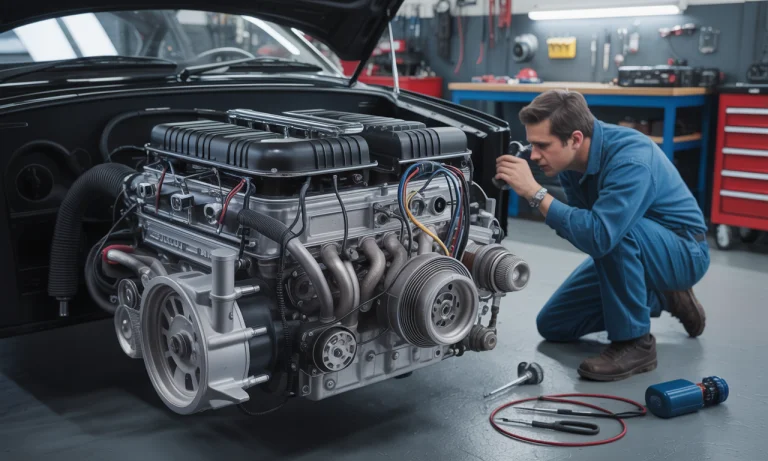The city hums with the rhythm of engines—a subtle orchestra of pistons, belts, and metal on asphalt. For many drivers, the gentle purr of their Toyota or Ford is reassuring, a sign that all is well under the hood. But when an unusual noise disrupts that harmony—perhaps a sudden rattle, squeak, or ominous hiss—anxiety creeps in. Is it an innocent quirk or the harbinger of a costly breakdown? From seasoned mechanics in bustling garages to family road-trips in a trusty Honda, the soundscape of our vehicles gives voice to hidden stories. Understanding these automotive messages isn’t reserved for experts. Armed with curiosity and a keen ear, anyone—from Volkswagen aficionados to BMW enthusiasts—can learn to distinguish between harmless oddities and urgent warnings. In a landscape where preventive maintenance saves thousands annually, recognizing the language of your car engine is more than a skill—it’s a form of urban self-defense.
Decoding Unusual Car Engine Noises: From Squeals to Knocks
Maria, owner of a well-loved Mercedes-Benz, first noticed it on her drive home—a faint squeal that surfaced every time she braked at the traffic lights. In another part of town, Jacob’s Nissan began to emit a grinding sound in the mornings, especially on cold starts. Each vehicle, whether a Chevrolet or an Audi, crafts a unique soundtrack as it ages. Yet, some sounds are near-universal clues: squealing on braking often points to worn brake pads or serpentine belts, while clunking from the suspension suggests loose or failing components. A grinding noise during gear shifts may hint at transmission troubles, a concern not exclusive to any make or model. Hissing could signal a coolant leak—common across Hyundai, Ford, or any other badge. Each note, each rhythm, is an invitation to listen and act before emergencies strike, echoing the experience of millions of drivers worldwide.
| Noise Type | Potential Cause | Common Vehicle Brands |
|---|---|---|
| Squealing | Worn brake pads, loose serpentine belt | Toyota, Ford, Mercedes-Benz |
| Grinding | Brake disc wear, transmission issues | Honda, Volkswagen, Hyundai |
| Clunking | Suspension problems, loose parts | Chevrolet, BMW, Nissan |
| Hissing | Coolant or exhaust leaks | Audi, Ford, Honda |
| Knocking/Pinging | Poor fuel, engine timing, internal damage | Toyota, BMW, Volkswagen |
The Art of Diagnosing Engine Sounds Effectively
While technology advances—think AI diagnostics at major BMW service centers or real-time analytics in the latest Audi dashboards—the human ear remains a powerful diagnostic tool. When an engine emits a strange noise, start with methodical observation: What triggers the sound? Acceleration, turning, or idling? The location—front, rear, or under the floor—matters. Maria, for instance, discovered her Mercedes-Benz’s squeal only appeared when slowing for traffic, pushing her to inspect her brakes rather than the engine. The context—weather, speed, time of day—offers clues. By combining intuition and deliberate checks, you can piece together the story behind each rattle or whine. Small interventions—a quick listen under the hood, a peek at the belts, a visual check for leaks—can unveil the source before the problem balloons into something unmanageable. In this interplay of perception and deduction, every driver becomes a detective in their own automotive tale.
Pinpointing the Source: Practical Steps and Real-World Scenarios
Imagine Alex, whose Hyundai began to emit a disconcerting knocking noise each morning—a sound that faded as the engine warmed. Such anecdotes are common, crossing continents and fleet brands. The key lies in narrowing down not just what is heard, but when and how. Systematic steps—identifying the tone (squeak, clunk, rattle), isolating the moment it arises, and recreating the conditions—are within everyone’s reach. Sometimes, it’s a quick fix: a loose heat shield on a Volkswagen or a worn belt in a Ford can be resolved in the driveway. Other times, a deeper dive is required—like checking a Honda’s suspension after persistent clunking over bumps. Testing, documenting, and knowing when to escalate to a professional is essential. These stories highlight a universal truth: every driver, whether behind the wheel of a BMW or a Nissan, holds the first line of defense against more serious repairs.
| Step | Objective | Tips |
|---|---|---|
| Identify Sound | Distinguish the noise type | Compare to common symptoms for your vehicle’s brand |
| Pinpoint Location | Find the exact area the sound originates | Have a partner drive while you listen from outside |
| Visual Inspection | Check for visible damage | Look for leaks, loose parts, worn belts |
| Test Scenarios | Drive under different conditions | Note when and how the noise changes |
| Consult Expert | When home diagnostics fall short | Bring detailed notes to your mechanic |
When Professional Help is a Lifesaver
There are times when the stories of troubleshooting reach their limit—the rumble persists, the metallic clatter grows louder, or a new symphony emerges. In those moments, professional insight becomes invaluable. Mechanics, especially those at service centers for brands like Toyota, Chevrolet, and Mercedes-Benz, are trained to interpret the subtlest engine signals and possess tools that go far beyond the average garage. Sarah, whose Audi developed a persistent whining, learned that an overlooked alternator fault could have left her stranded had she delayed. Reaching out to experts, equipped with your observations, not only accelerates the repair process but can prevent cascading failures. The lesson is enduring: trust your instincts, respect your limits, and remember that timely intervention transforms potential disaster into a manageable pit stop.
Understanding and Troubleshooting Noises in Braking, Suspension, and Exhaust Systems
Beyond the engine, the car’s broader mechanical ensemble—including brakes, suspension, and exhaust—contributes to its auditory portrait. A Volkswagen’s grinding brakes, a BMW’s clunking over potholes, or the persistent rattle beneath a Chevrolet after a sharp turn—each noise has roots and remedies. For some, it’s as simple as swapping worn brake pads or lubricating joints; for others, it prompts a comprehensive suspension check or a deep dive into exhaust components. Recognizing prompting cues—like a thump that only appears with certain maneuvers—empowers timely action. And in the background, stories abound: the Ford that survived a cross-country journey thanks to early noise detection, the Hyundai that avoided a breakdown after a prompt exhaust fix. These anecdotes remind us: beneath every odd sound lies both a challenge and an opportunity for care.
Real-life Q&A: What Drivers Want to Know About Unusual Car Engine Noises
How can I tell if my car has an exhaust leak?
Unusually loud hissing or popping—especially from underneath—often signals an exhaust leak. Watch for decreased performance, poor fuel economy, or strange cabin smells. A timely mechanic inspection is critical, regardless of whether you drive a Nissan or Honda.
What usually causes persistent squeaking in my car?
Squeaky sounds commonly stem from the brake system—worn pads or trapped debris. For suspension-related squeaks, deteriorating bushings are frequent culprits. Persistent issues, especially on BMW, Toyota, or Ford models, warrant early attention to prevent further damage.
Is a whining noise necessarily a bad alternator?
Not always, but a whining from the engine bay often points to the alternator, especially in Audi and Mercedes-Benz vehicles. It may also arise from failing belts or power steering pumps. If left unchecked, it can lead to more severe electrical issues or overheating.
Should I avoid driving with a rattling sound over bumps?
If rattling emerges over bumps, it typically indicates suspension issues (shock absorbers, struts) or loose undercarriage parts. In any Chevrolet, Volkswagen, or Hyundai, it’s wise to inspect promptly—delayed attention can turn quick fixes into major repairs.
Where should I begin troubleshooting a new car noise?
Start by listening—pinpoint the timing, frequency, and location. Consult your manual for your car’s make, whether Nissan or Ford. If basic checks don’t reveal the issue, seek professional support, especially if the noise increases or changes suddenly.
Did you like it? 4.6/5 (24)






